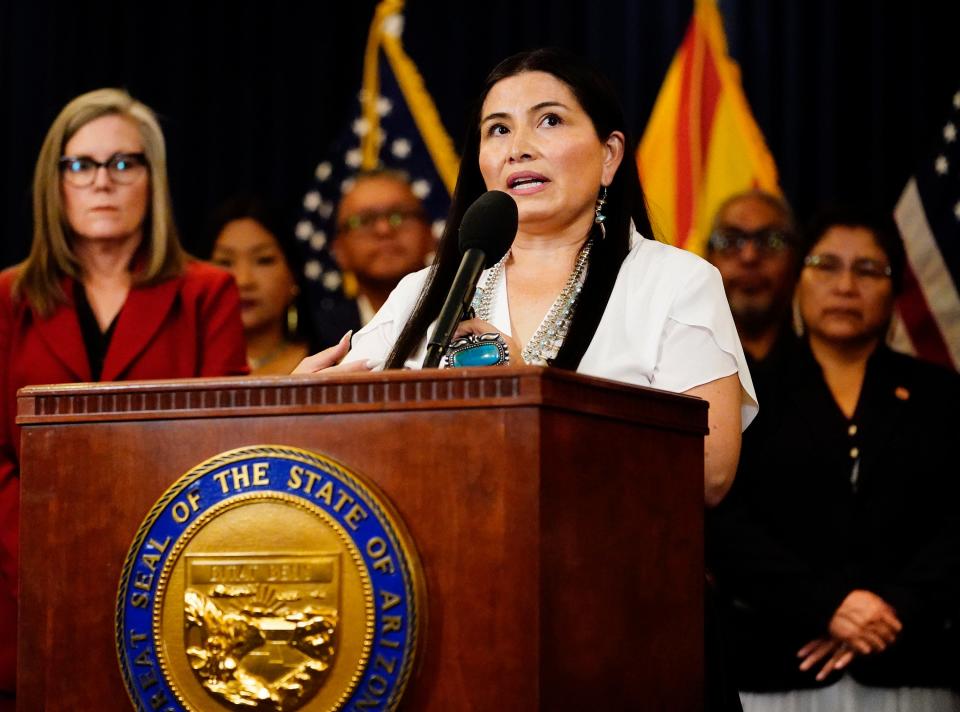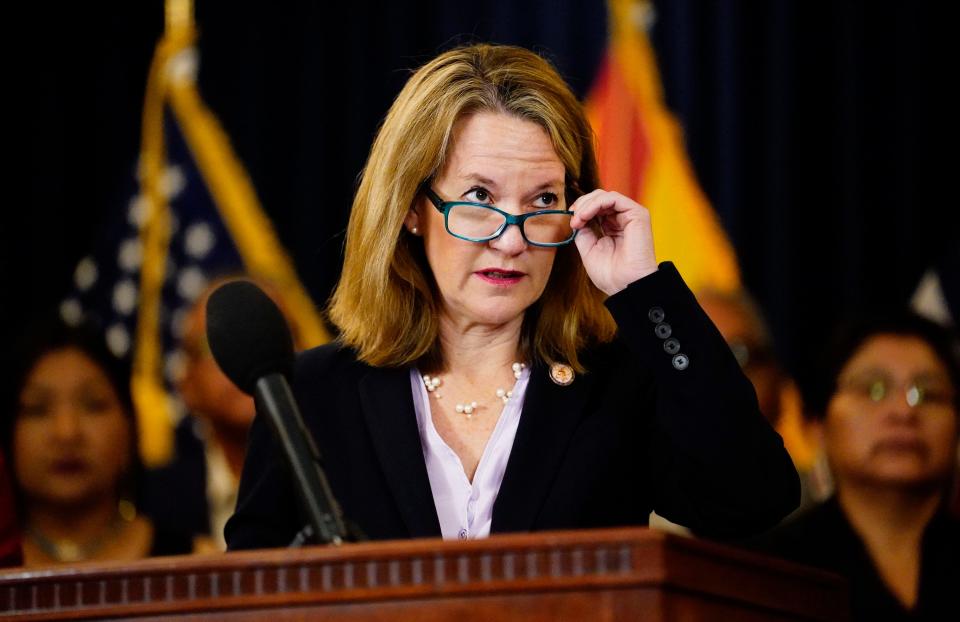Fake rehab clinics reportedly fleeced state of 'hundreds of millions,' victimized tribal members
In what Arizona Attorney General Kris Mayes called a "stunning failure of government," state officials say criminals masquerading as health providers defrauded Arizona taxpayers out of "hundreds of millions of dollars" and victimized Indigenous people.
The illegal activity involved billing for mental health treatment and addiction rehabilitation that never was provided. The money, which Mayes only could specify as hundreds of millions, was paid out by the Arizona Health Care Cost Containment System, Arizona's Medicaid program.
In some cases, the treatment was reportedly provided to people who were dead, were in jail or who were children. Mayes cited instances where bills were submitted to AHCCCS for services "impossible to render" such as alcohol rehabilitation to a 4-year-old who was not in one of the facilities and did not need treatment.
The criminals operating the fake treatment centers targeted vulnerable Indigenous Arizonans, aggressively recruiting them at places like gas stations, grocery store parking lots and at bus stops outside of Indian Health Service clinics, tribal and state officials said.
In some cases, the Indigenous people who were targeted had to jump out windows and climb over walls to escape the facilities, which typically were located in the Phoenix area, state officials said.
Mayes, Arizona Gov. Katie Hobbs and representatives of 13 Arizona tribes made the announcement at a news conference on Tuesday morning. The investigation, which involved the FBI and the U.S. Attorney's Office, has resulted in at least 45 indictments by Mayes' office. Mayes said $75 million has been seized or recovered related to the schemes.
"I don't think it is too much to say that this is one of the biggest scandals in the history of the state of Arizona when it comes to our government," Mayes told reporters.
"The human impact of this fraud is the most heartbreaking of all. While these scammers are using random IDs to bill for millions of dollars of services, thousands of Arizonans are in real need. Some have been living in these facilities or homes while not being provided the services they need."
Mayes told The Arizona Republic that her office believes the fraudulent billing scheme began with a criminal syndicate that came to Arizona from Nevada, where it was engaged in similar activity.
"Nevada shut it down up there. They came down here, realized we had the same vulnerabilities, and then it just metastasized from there," Mayes said. "It's very much like a franchise business where they have expanded and expanded and expanded, knowing that this pot of money is available."
Arizona has a hotline for victims, families
Hobbs said AHCCCS has been conducting an audit of billing claims since 2019.
"We are going to prosecute existing bad actors, ensure that wraparound services are delivered to the people affected by provider closures, and enact systemic reforms in the AHCCCS billing system to root out this kind of fraudulent billing moving forward," the governor said, quickly acknowledging the human toll of the fraud.
"To the individuals and families affected by these suspensions, my heart is broken by the pain that you have been forced to endure. The state of Arizona believes you, we stand with you, and we are committed to working with you to solve this problem and get people home safe."
While most health care provided through AHCCCS is handled by managed care organizations, a program called the American Indian Health Program is fee-for-service, which means providers are paid directly by AHCCCS for the individual services they perform, and services aren't bundled.
In other words, the behavioral health providers suspected to be fraudulent have been billing AHCCCS directly for the alleged treatment they gave.
Arizona has a dedicated hotline for individuals who have been affected by the fraudulent centers. Anyone who was affected should call 2-1-1 and press 7 for help. The Navajo Nation is setting up a command center for families, Ethel Branch, the tribe's attorney general, told reporters on Tuesday.

"We are going to have an on-site emergency operations center here in the Valley," Branch said. "We anticipate large numbers of impacted individuals are Navajo tribal members. So we will be here to receive our relatives and make sure that they are smoothly transitioned into licensed facilities where they will actually receive the services that they believed they would be receiving."
The Republic examined four grand jury indictments related to the alleged billing scheme, each from Maricopa County Superior Court. The indictments accuse multiple individuals of various crimes, among them conspiracy, illegal control of an enterprise, theft, money laundering and fraudulent schemes.
An ongoing and regularly updated list of registered providers subject to payment suspension or termination is posted on the AHCCCS Office of Inspector General Provider Suspensions web page. Officials with the Arizona Department of Health Services, which licenses sober living homes, behavioral health residential facilities and outpatient clinics, said in a statement that they are working to more easily find and "eliminate bad actors from our behavioral health system."
Arizonans are encouraged to check AZCareCheck.com to review the status of licensed facilities.
Hobbs, Mayes criticize Ducey administration
Mayes said since May 3 providers have tried to bill the state 3,000 to 4,000 times using a health-care code that the state had cut off as part of its crackdown.
"It gives you a sense of the scope," she said.
The Democratic leaders each criticized their Republican predecessors for a lack of action on the issue, though they took different tones in doing so.
Hobbs said under the previous administration, AHCCCS took a “piecemeal approach to targeting these fraudulent providers" and that the ability to defraud AHCCCS was ingrained in the system for years without proper action taken.
“The prior administration did this on a case-by-case basis, never implementing the systemic overhauls necessary to root out this problem and failing to deliver true accountability,” the governor said. "Unfortunately, this approach led to fraudulent providers continuing to exploit tribal communities for their own financial gain."
Mayes lambasted former Gov. Doug Ducey and former Attorney General Mark Brnovich, both Republicans, by name.

Brnovich ignored concerns of his own deputy prosecutors who for years had been “pleading” for sweeping action to prevent further AHCCCS fraud, Mayes said. The fraudulent schemes "never should have been allowed to happen," she said.
“The Ducey administration was at best negligent while they allowed scam artists and fraudsters to take advantage of the antiquated, outdated systems and incompetent management of AHCCCS,” Mayes said. “In the wake of their ineffectiveness, some of the most vulnerable individuals in our state were harmed and taxpayers paid for it.”
Asked if she would consider legal action against the Ducey administration, Mayes said investigations were ongoing and she was not “taking anything off the table.”
“What has happened is tragic and outrageous," she said. “And I'll just speak for myself as the attorney general of the state. I believe the state of Arizona owes our tribal nations an apology.”
Brnovich didn’t respond to a message seeking comment for this article.
A former Ducey aide noted a tacit acknowledgment during the Democrats’ news conference that more than 40 indictments had been issued and an investigation was ongoing for years, "well before the current occupants took office.”
“Today’s grandstanding reveals a lack of interest in actual governing,” former Ducey chief of staff Daniel Scarpinato said, echoing a line often repeated by the former governor: “They should just do their jobs.”
Of 45 indictments so far, 28 came under Brnovich’s tenure, according to Mayes’ office. The remaining 17 indictments were handed down in Mayes’ five-month term in office, her spokesperson said. Brnovich's office had announced indictments related to the fraud scheme in at least one news release from 2021 that included a list of accused individuals and related businesses.
Mayes said her office is prepared to prosecute the perpetrators "to the fullest extent of the law." If there's evidence that operators of the behavioral health facilities were negligent, and in cases where patients died or were raped, "that will also be investigated by the proper law enforcement officials."
Indigenous affairs: Hobbs urges new task force to seek justice for missing and murdered Indigenous people
Advocates: Some missing Indigenous people are victims of phony clinics
A legislative Ad Hoc Committee for Missing and Murdered Indigenous Peoples heard testimony last year about the problem of fake clinics, as some advocates believe the sham treatment programs are contributing to a growing number of missing Indigenous people.
State Sen. Theresa Hatathlie, D-Coal Mine Canyon, introduced Senate Bill 1661 in this legislative session as an attempt to strengthen the admission policies into behavioral health residential facilities.
In testimony to the state Senate Health and Human Services Committee on Feb. 14, she said many of the facilities are "predatory" and "fraudulent."
She told a story about an elderly Navajo man who went into a gas station and begged for help to escape from recruiters who were trying to take him to a treatment center in Phoenix. Such stories are typical, she said, adding that in this case the situation had a good ending ― employees at the gas station provided help and the man's daughter was able to pick him up. But other individuals have not been as fortunate, the committee heard.
"Overall, there's a huge operation that's going on," Hatathlie testified. "It's very sophisticated, to say the least ... Many of the victims are afraid to come forward."
Navajo Nation first lady Jasmine Blackwater-Nygren told the committee some tribal members are finding themselves in facilities where they are given alcohol and drugs to prevent them from leaving so that the owners of the facilities "can continue to receive" government money.
Hatathlie testified that one individual can bring $7,000 or more per month in government money to the group homes. In some cases, individuals are dying in the so-called rehab homes and buried in paupers' graves without their families ever knowing what happened to their loved ones.
"This practice has been going on for years," she said. "It's just now finally coming to light."
Since at least January, the FBI has had an online callout form that seeks "victims who may have been recruited to live in and receive services in group homes (Behavioral Health Residential Facilities) located in Phoenix," between January 2020 and the present.
The FBI callout form talks about "organizers" who are targeting Native Americans to live in group homes under the guise of getting treatment for mental illness and substance abuse, but that often no therapy services are provided, even though the group homes are receiving government funding.
"Organizers frequent community gathering locations such as flea markets, trading posts, and medical centers to pick up clients," and they are finding clients from the Navajo Nation as well as other tribal communities in Arizona, New Mexico and South Dakota, the callout form says.
Republic reporter Arlyssa Becenti contributed to this article.
Reach health-care reporter Stephanie Innes at stephanie.innes@gannett.com or at 480-313-3775. Follow her on Twitter @stephanieinnes. Reach reporter Stacey Barchenger at stacey.barchenger@arizonarepublic.com or 480-416-5669. Follow her on Twitter @sbarchenger.
This article originally appeared on Arizona Republic: Fake rehab centers fleeced Arizona, victimized Indigenous people
